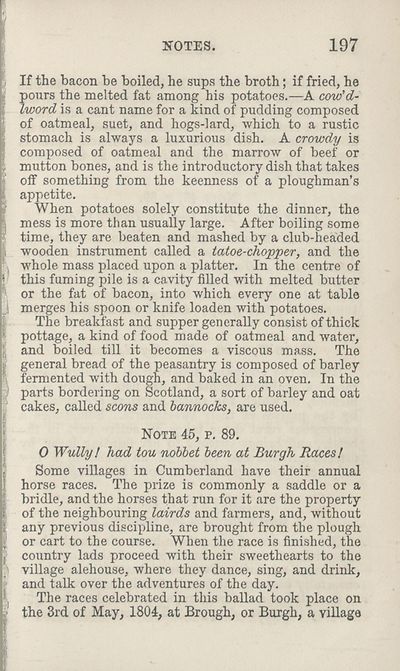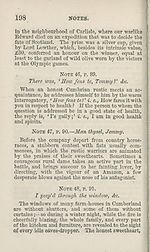Download files
Complete book:
Individual page:
Thumbnail gallery: Grid view | List view

NOTES.
197
If the bacon be boiled, he sups the broth; if fried, he
pours the melted fat among his potatoes.—A cow’d-
Iword is a cant name for a kind of pudding composed
of oatmeal, suet, and hogs-lard, which to a rustic
stomach is always a luxurious dish. A crowdy is
composed of oatmeal and the marrow of beef or
mutton bones, and is the introductory dish that takes
oif something from the keenness of a ploughman’s
appetite.
When potatoes solely constitute the dinner, the
mess is more than usually large. After boiling some
time, they are beaten and mashed by a club-headed
wooden instrument called a tatoe-chopper, and the
whole mass placed upon a platter. In the centre of
this fuming pile is a cavity filled with melted butter
or the fat of bacon, into which every one at table
merges his spoon or knife loaden with potatoes.
The breakfast and supper generally consist of thick
pottage, a kind of food made of oatmeal and water,
and boiled till it becomes a viscous mass. The
general bread of the peasantry is composed of barley
fermented with dough, and baked in an oven. In the
parts bordering on Scotland, a sort of barley and oat
cakes, called scorn and bannocks, are used.
Note 45, p. 89.
0 Wully! had ton nobbet been at Burgh Races!
Some villages in Cumberland have their annual
horse races. The prize is commonly a saddle or a
bridle, and the horses that run for it are the property
of the neighbouring lairds and farmers, and, without
any previous discipline, are brought from the plough
or cart to the course. When the race is finished, the
country lads proceed with their sweethearts to the
village alehouse, where they dance, sing, and drink,
and talk over the adventures of the day.
The races celebrated in this ballad took place on
the 3rd of May, 1804, at Brough, or Burgh, a village
197
If the bacon be boiled, he sups the broth; if fried, he
pours the melted fat among his potatoes.—A cow’d-
Iword is a cant name for a kind of pudding composed
of oatmeal, suet, and hogs-lard, which to a rustic
stomach is always a luxurious dish. A crowdy is
composed of oatmeal and the marrow of beef or
mutton bones, and is the introductory dish that takes
oif something from the keenness of a ploughman’s
appetite.
When potatoes solely constitute the dinner, the
mess is more than usually large. After boiling some
time, they are beaten and mashed by a club-headed
wooden instrument called a tatoe-chopper, and the
whole mass placed upon a platter. In the centre of
this fuming pile is a cavity filled with melted butter
or the fat of bacon, into which every one at table
merges his spoon or knife loaden with potatoes.
The breakfast and supper generally consist of thick
pottage, a kind of food made of oatmeal and water,
and boiled till it becomes a viscous mass. The
general bread of the peasantry is composed of barley
fermented with dough, and baked in an oven. In the
parts bordering on Scotland, a sort of barley and oat
cakes, called scorn and bannocks, are used.
Note 45, p. 89.
0 Wully! had ton nobbet been at Burgh Races!
Some villages in Cumberland have their annual
horse races. The prize is commonly a saddle or a
bridle, and the horses that run for it are the property
of the neighbouring lairds and farmers, and, without
any previous discipline, are brought from the plough
or cart to the course. When the race is finished, the
country lads proceed with their sweethearts to the
village alehouse, where they dance, sing, and drink,
and talk over the adventures of the day.
The races celebrated in this ballad took place on
the 3rd of May, 1804, at Brough, or Burgh, a village
Set display mode to:
![]() Universal Viewer |
Universal Viewer | ![]() Mirador |
Large image | Transcription
Mirador |
Large image | Transcription
| Antiquarian books of Scotland > Poetry > Ballads in the Cumberland dialect > (201) |
|---|
| Permanent URL | https://digital.nls.uk/125707627 |
|---|
| Description | Thousands of printed books from the Antiquarian Books of Scotland collection which dates from 1641 to the 1980s. The collection consists of 14,800 books which were published in Scotland or have a Scottish connection, e.g. through the author, printer or owner. Subjects covered include sport, education, diseases, adventure, occupations, Jacobites, politics and religion. Among the 29 languages represented are English, Gaelic, Italian, French, Russian and Swedish. |
|---|

